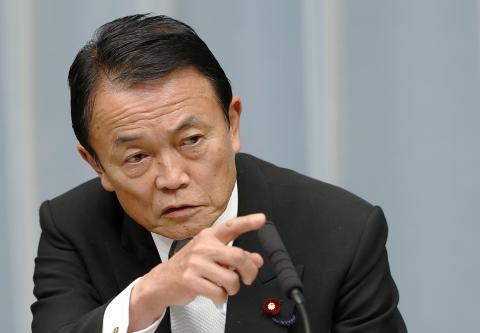The head of Japan’s central bank has vowed to work with the nation’s new government to tackle deflation, according to an interview published yesterday.
“The Bank of Japan, not just the government, will support efforts to strengthen growth potential,” Bank of Japan Governor Masaaki Shirakawa told the Nikkei business daily.
Shirakawa added that both monetary easing and measures to strengthen economic growth were necessary to boost inflation.

Photo: Reuters
He made the remarks after Shinzo Abe, sworn in as Japan’s prime minister on Wednesday, proposed the bank set a 2 percent inflation target in a bid to fight deflation that has plagued the world’s third largest economy for years.
On Thursday, newly appointed Japanese Finance Minister Taro Aso also hit out at the bank, saying it was “slow” in tackling deflation.
However, Shirakawa stopped short of agreeing to the proposed target, only saying: “We hope to thoroughly discuss figures at the next policy board meeting [in January]. What will be important is securing flexibility within monetary policy.”
Deflation continues to pose a threat to Japan’s recovery as a fall in prices eats into corporate profits, leading firms to slash jobs and put off growth-generating capital investment.
It also hurts demand because it encourages consumers to put off making purchases in the hope of paying less further down the road.
In its previous board meeting last week, the bank launched its third round of easing since September after counterparts in the US and Europe also ushered in huge moves to counter slowing growth.
The move was widely seen as a bow to Abe, whose comments have been viewed as a direct challenge to the bank’s independence in setting policy.
The Japanese economy is facing many hurdles as it struggles to reverse long-term deflation, according a report from ratings agency Standard & Poor’s on Friday.
The Liberal Democratic Party took power this week on a campaign that pledged to inject new life into the limp economy, after it won a landslide election earlier this month.
S&P said the election raised hopes the world’s third-largest economy may be able to escape the deflation that has haunted it for years, and recommended that policy makers “aggressively implement” measures to do so.
“It is positive that the Japan reflation issue is in play again and, with the change in government, Japan is likely entering a period of both policy and market action,” S&P’s chief economist Paul Sheard said. “However, the hurdles to a policy-induced reflation are many, and they are high.”
The report said past actions by the Bank of Japan were not enough and warned it was unlikely the bank would take the sweeping actions necessary to bring about reflation.
The report comes as data released on Friday showed consumer prices in Japan slipped 0.1 percent on an annualized basis.

IN THE AIR: While most companies said they were committed to North American operations, some added that production and costs would depend on the outcome of a US trade probe Leading local contract electronics makers Wistron Corp (緯創), Quanta Computer Inc (廣達), Inventec Corp (英業達) and Compal Electronics Inc (仁寶) are to maintain their North American expansion plans, despite Washington’s 20 percent tariff on Taiwanese goods. Wistron said it has long maintained a presence in the US, while distributing production across Taiwan, North America, Southeast Asia and Europe. The company is in talks with customers to align capacity with their site preferences, a company official told the Taipei Times by telephone on Friday. The company is still in talks with clients over who would bear the tariff costs, with the outcome pending further

NEGOTIATIONS: Semiconductors play an outsized role in Taiwan’s industrial and economic development and are a major driver of the Taiwan-US trade imbalance With US President Donald Trump threatening to impose tariffs on semiconductors, Taiwan is expected to face a significant challenge, as information and communications technology (ICT) products account for more than 70 percent of its exports to the US, Chung-Hua Institution for Economic Research (CIER, 中華經濟研究院) president Lien Hsien-ming (連賢明) said on Friday. Compared with other countries, semiconductors play a disproportionately large role in Taiwan’s industrial and economic development, Lien said. As the sixth-largest contributor to the US trade deficit, Taiwan recorded a US$73.9 billion trade surplus with the US last year — up from US$47.8 billion in 2023 — driven by strong

A proposed 100 percent tariff on chip imports announced by US President Donald Trump could shift more of Taiwan’s semiconductor production overseas, a Taiwan Institute of Economic Research (TIER) researcher said yesterday. Trump’s tariff policy will accelerate the global semiconductor industry’s pace to establish roots in the US, leading to higher supply chain costs and ultimately raising prices of consumer electronics and creating uncertainty for future market demand, Arisa Liu (劉佩真) at the institute’s Taiwan Industry Economics Database said in a telephone interview. Trump’s move signals his intention to "restore the glory of the US semiconductor industry," Liu noted, saying that

AI: Softbank’s stake increases in Nvidia and TSMC reflect Masayoshi Son’s effort to gain a foothold in key nodes of the AI value chain, from chip design to data infrastructure Softbank Group Corp is building up stakes in Nvidia Corp and Taiwan Semiconductor Manufacturing Co (TSMC, 台積電), the latest reflection of founder Masayoshi Son’s focus on the tools and hardware underpinning artificial intelligence (AI). The Japanese technology investor raised its stake in Nvidia to about US$3 billion by the end of March, up from US$1 billion in the prior quarter, regulatory filings showed. It bought about US$330 million worth of TSMC shares and US$170 million in Oracle Corp, they showed. Softbank’s signature Vision Fund has also monetized almost US$2 billion of public and private assets in the first half of this year,